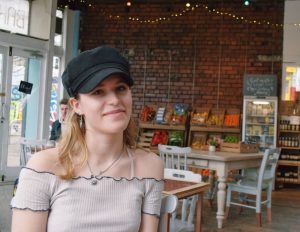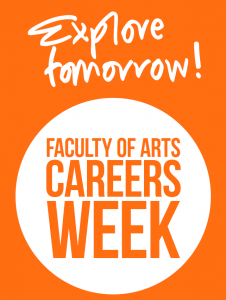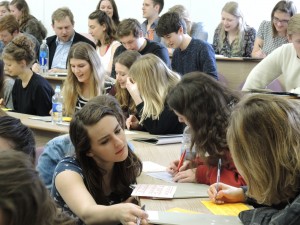Hundreds of you attended the Faculty of Arts Careers Series, where alumni shared their fascinating journeys from their Arts degree to their current career.
Category: Creative careers
3 reasons to make the most of the Faculty of Arts Careers Series this February
The pandemic has impacted so much, including the world of work. The ongoing uncertainty can feel de-motivating; it may feel easier to avoid thinking about careers right now and to put it off until later. However, it could be an ideal time for career thinking and looking at what the Faculty of Arts Careers Series has to offer, (more…)
Getting your dream job in the media
Are you looking for the holy grail?

Don’t miss our series of popular events during Media and Creative Industries Week!
We’re often asked for a list of graduate vacancies in the media. The problem is it doesn’t really exist. At least not in one place. But the good news is that with determination and creativity you can hunt down hidden opportunities.
My Assistant Editor Internship
Iona describes her experience of the SME Internship Schemes during her final year at the University of Bristol. If you’re inspired by her story, you can find out more about the schemes and how to get involved here. 
Hi, I’m Iona. I graduated with a degree in Cellular and Molecular Medicine in July, and from March to June interned as an Assistant Editor at the leading events website in the city – 365bristol.com – through the Santander scheme. (more…)
Winning the Object Challenge- creative use of a split pin
By Jojo Dance and Hazel Welsh

The Object Challenge was run at the Engineering&IT fair by the Basecamp team who help students improve their enterprise and entrepreneurial skills. Students were given one week to come up with a creative idea to add value to a split pin (traditionally used to hold paper together) and upload a 90 second video of their idea to YouTube.
Trying to come up with an idea that would give value to a split pin was a challenge. All our initial ideas were very obvious and weren’t creative enough to stand out. We struggled for some time trying to come up with a way to use/manipulate the item and then potentially ‘sell’ the item in the short video. But we found these ideas very limiting. So, we decided to try and think outside of the box to come up with a winning idea. After some thought, we realised that the presentation would be taking place on Halloween, so we decided to go with a Halloween themed object. This way we could have some fun with the concept, whilst also giving the split pin some added spiritual value.
My internship experience
by Jess Blackwell
I think it’s safe to say that I was feeling rather panicked before I got some advice from the Careers Service at University. In fact, I feel panicked is a slight understatement – I was absolutely convinced that I was doomed to a life of unemployment and/or a job that sucked out my soul. Luckily, the Careers Service managed to help me out a bit.

Faculty of Arts Careers Week 2018 report
The first three days of the Faculty of Arts Careers Week took place from 26th-28th February. Students heard from over 27 alumni and professionals on their respective careers, as speakers shared their experiences of how they have progressed through their career from graduation, and how to forge a successful career. Tips and advice were given, and students were able to hear about the positives and negatives of a variety of roles and sectors.

The Media Careers Conference 2015 – what the students thought
On the 30th and 31st of March, over 90 students gathered in the Arts Complex for the Media Careers Conference. Over the course of the two day event, various media insiders (including Bristol alumni) came to meet students and deliver talks, providing students with an all-important insight into the world of media. Here two students, a fresher and a final year share their experiences of the event.
Emily Faint, First Year
As a fresher, I initially questioned the value of attending a careers conference. My career plans were hazy, and I certainly wasn’t looking to secure graduate placements given that graduation is still a mercifully distant future for me. By the end of the event, however, I was startled by how much the talks allowed me to clarify my thoughts regarding which career paths did, and didn’t, suit me. Each speaker had a wealth of information and advice to share, which included everything from the obvious suggestion of opening a LinkedIn account to dispelling myths about the perceived glamour of media careers.
Alex Ayling, a Bristol graduate who now works at BBC Worldwide, was a particularly notable speaker. He spoke of the importance of humility and resilience for those seeking a media career. I was startled to learn that companies such as the BBC rarely hire full-time staff, instead opting to recruit employees on a short-term basis depending on current projects. Patrick Ayree, a wildlife filmmaker and presenter, was also a delight to listen to. One of the most encouraging messages I received from Ayree was for young people to remember their value; young people are essential to the media and it is important to guard against feeling undervalued because of your inexperience at the beginning of your career.
For someone on the first rung of what I hope will be an interesting and varied career ladder, I’m certain the guidance I received at the conference will continue to benefit me for years to come.
Emily hard at work at the conference!
Niamh Callaghan, Final Year
As a final year English undergraduate, I came to the conference looking for some careers advice and some tips on how to get into the media industry. On the first day, I went to sessions about digital television, copywriting in advertising, multi-platform production, and radio presentation. The networking sessions with previous graduates were really encouraging and gave some great advice. The careers service discussion about using resources (other than Google) to research careers was also useful, particularly as that is what I am currently doing after Graduation!
On the second day I went to two different workshops, one from Cardiff School of Journalism and another from Immediate Media. The journalism discussion encouraged everyone to find how they personally stand out from the crowd – learning technological skills is, apparently, very advantageous. The magazine publishers from Immediate Media spoke about identifying audiences and product pertinence. I also attended a talk from BBC Talent Management about routes into the BBC. It was interesting to learn about career-specific skills and I was inspired to start learning some more.
One thing that seemed to come up a lot from every speaker was that, in order to work in the media, you should be creating a portfolio: filming videos, writing scripts, and building blogs. The general consensus was to make things! The whole conference gave me some great advice for me to really begin my careers search. I left a lot more certain about my future career, with a handful of new connections on LinkedIn to get me started!
Media Careers Conference
Every year the Careers Service puts on an event dedicated to finding out about careers within the media industry. So if you think you’re the next Jon Snow, Arianna Huffington, or even Don Draper (see Mad Men!) then this is the conference for you. Last year the conference took place at the beginning of Easter and all students could choose two pathways and attend workshops linked to those pathways. These were: Journalism Publishing Advertising, marketing and PR Creative industries Broadcast (TV and radio) Film and production The speakers at the conference ranged from recent alumni now working in film production through to the former Director of BBC World Service and Global News. The conference gave students the opportunity to talk with employers and alumni and find out more about different areas of the media industry. Last year speakers included representatives from
Publishing Advertising, marketing and PR Creative industries Broadcast (TV and radio) Film and production The speakers at the conference ranged from recent alumni now working in film production through to the former Director of BBC World Service and Global News. The conference gave students the opportunity to talk with employers and alumni and find out more about different areas of the media industry. Last year speakers included representatives from
- BBC
- Dorling Kingsley
- McCann Erikson
- Films@59
- The Sun on Sunday
- Cardiff School of Journalism
- Heart FM
- Immediate Media and many more
What did the participants have to say about the conference? “I went into the Media Conference not knowing much about the Media Industry; I came out knowing more about the ins-and-outs of what a job in media entails. We heard from a wide range of people within the industry, covering journalism, social media and documentaries. They described what it takes to work in the industry, what experience you need, and what to expect from a job in media. This conference helped me understand what I do and don’t want from a career, finding out more about any job you’re considering is definitely worth doing to help point your future in the right direction for you” Madeleine (Current UoB student) How else did the course help the participants?
“I learnt about the processes and differences between jobs and companies”
“Learnt that journalism is something I’d love and learnt what to do and how to get there”
“Realise that post production is something I would really enjoy doing”
“Found a company I am interested in contacting”
“Made contacts and have a clear idea of different career paths available to me”
“Have specific areas in marketing and PR I’m interested in”
“Understand that there isn’t one set way/importance of contacts and networking”
“Eliminated some career paths and became more interested in other areas”
Media Careers Conference 2015 This year’s conference is taking place on Monday 30th & Tuesday 31st March 2015. To book your place, go to the Careers Service website “I found the media conference really helpful, mostly as it let me know that what I was doing was the right thing, and I also got a few pointers on how to get work experience.” Max, UoB Graduate 2014, now working as a Sports Journalist
Career profile: costumier
Jo Sims has provided the following profile with lots of hints and tips about how to get into the exciting industry of freelance costume making.
Job titles: costumier / costume maker, costume assistant, costume trainee, costume supervisor
Employer: freelance, but have worked for Hackney Music Development Trust, Red Production (Scott & Bailey Series 2), Scottish Opera and Sheffield Theatres.
Education:
- Theatrical costume making – a non-accredited 15 week intensive practical course (Northern College of Costume, York, 2011)
- MA Design Innovation Strategy (SheffieldHallamUniversity, 2001)
- BA (Hons) Surface Pattern Design (University of Huddersfield, 1998)
- HND Graphic Design (Nene College, 1993)

My work as a costume maker involves making up costumes under the guidance of the pattern cutter, assisting on costume fittings, and making alterations in time for the dress rehearsals. I’m also experienced in pattern drafting, draping on the stand, and some costume design (done on the course). As a freelancer I also have to be able to manage my time and be constantly looking ahead for the next project.
How did you get your job?
I did a two week work placement at Scottish opera in Glasgow straight after finishing a 15 week intensive costume making course. While there the ladies cutter/workshop manager gave my details on to a friend (a costume designer) who was working on an ITV drama in Manchester. I got in touch and met the Designer (Rhona Russell) after my placement and was offered a 16 week contract as costume trainee on the drama starting the next day! I think it was very much about having a direct contact and being in the right place at the right time. Following on from this I was recommended as a costume supervisor for Shadowball, a touring jazz opera, working with children aged 7-9 (by the Head of Wardrobe in Sheffield, where I’d volunteered one day a week for two months in 2010). I was then contacted by Scottish Opera who wanted me to work for them for 12 weeks, after being happy with me on my work placement. I also secured more work with Sheffield Theatres in November 2012 for pantomime and with Scottish Opera in 2013. So my few contacts have gone a very long way.
I do hope to gain work in New York though, so that’s where I’ll really have to push marketing myself.
How did your degree help?
Having a degree has helped me gain all my organisational skills (as well as the 10 years that I worked for e-learning companies after my Masters). It has helped time management, project planning, developed specific technology skills (Adobe PhotoShop, Illustrator, Flash, Dreamweaver).
The intensive costume making course taught me historical costume construction, pattern drafting, draping on the stand, sewing techniques, tailoring. The course covers a lot in 15 weeks because by the end of it I’d made an 1820 gents eveningwear costume – consisting of pantaloons, shirt, waistcoat and tailcoat; 1880s bustle gown – consisting of underwear (combinations, corset bustle cage, petticoat), foundation skirt, bustle apron, bodice and additional gloves and bag; 1940s ladies eveningwear. Because the course was practical we only had one day per project to research and come up with the designs. It was much more focused on practical skills rather than design and development skills.
What advice would you give anyone else wanting to get into costume design?
Placements are so valuable. At the time it seems really difficult working for nothing, but it has paid off so much with how much work I’ve got from 8 days volunteering (over 2 months) at Sheffield Theatres in 2010 and 2 week work placement (unpaid) at Scottish opera in Glasgow. Costume making in particular is such a small industry in that everyone knows everyone, so it’s really important to make the best possible impression rather than taint your career with a lack of enthusiasm.
Due to the nature of the work, unless you live in or near London, you’ll have to do a fair bit of travelling to get work, but once you’ve made your few initial contacts they do call you back for more work.
For more information see Jo’s website.

